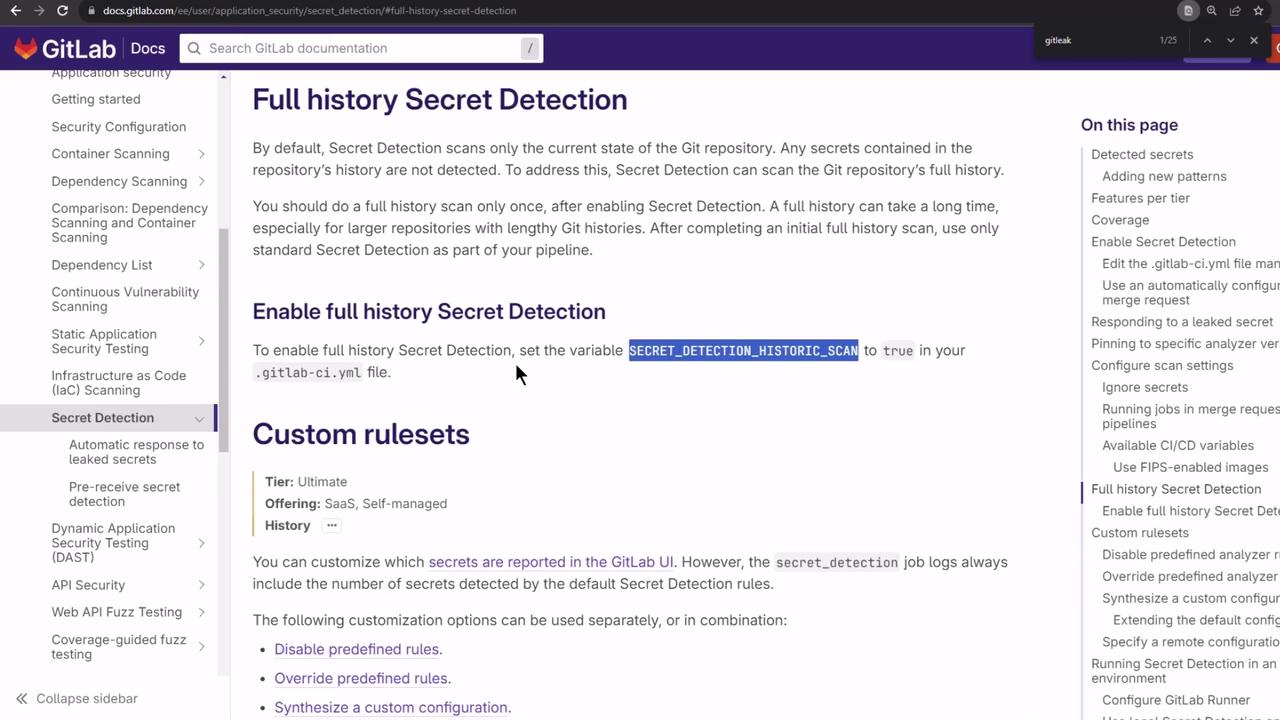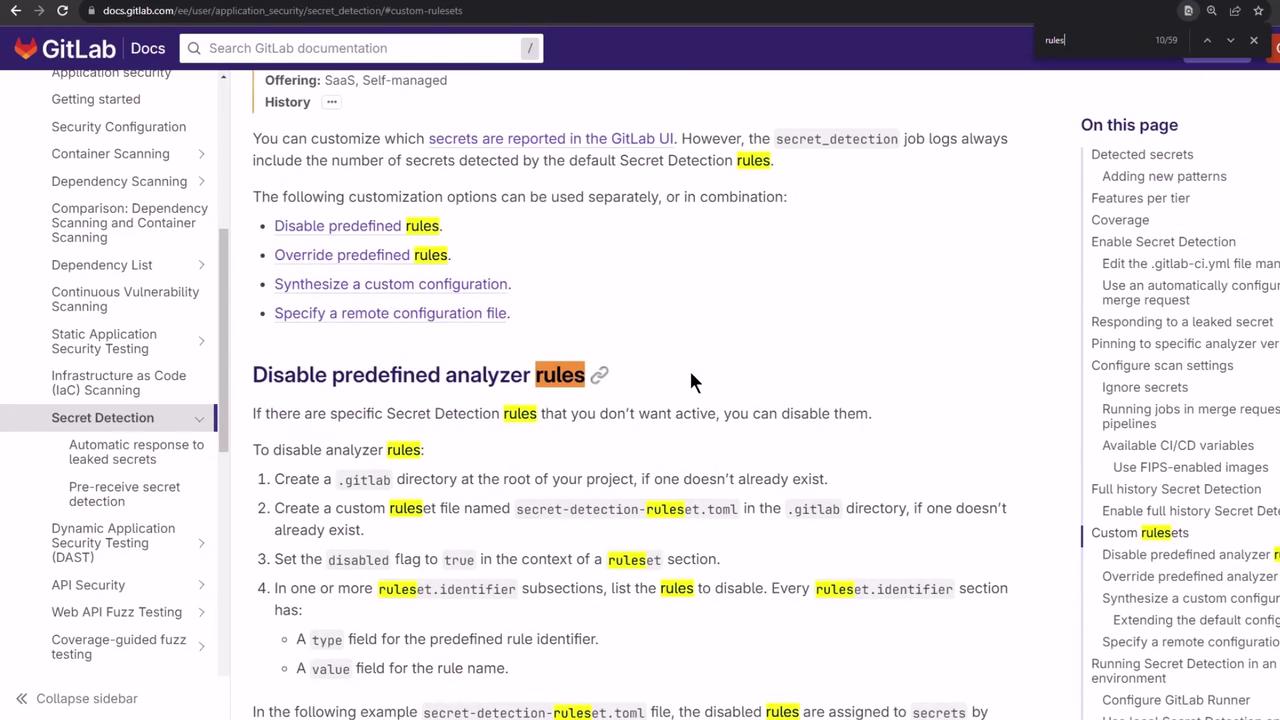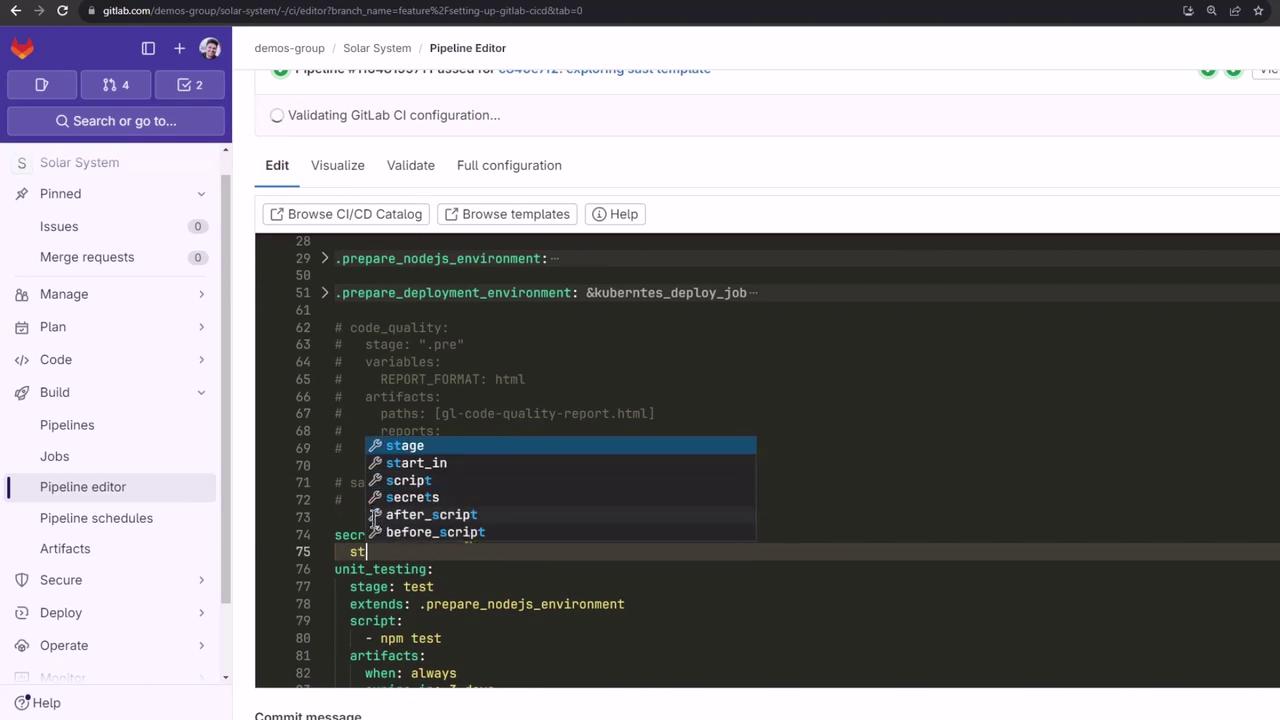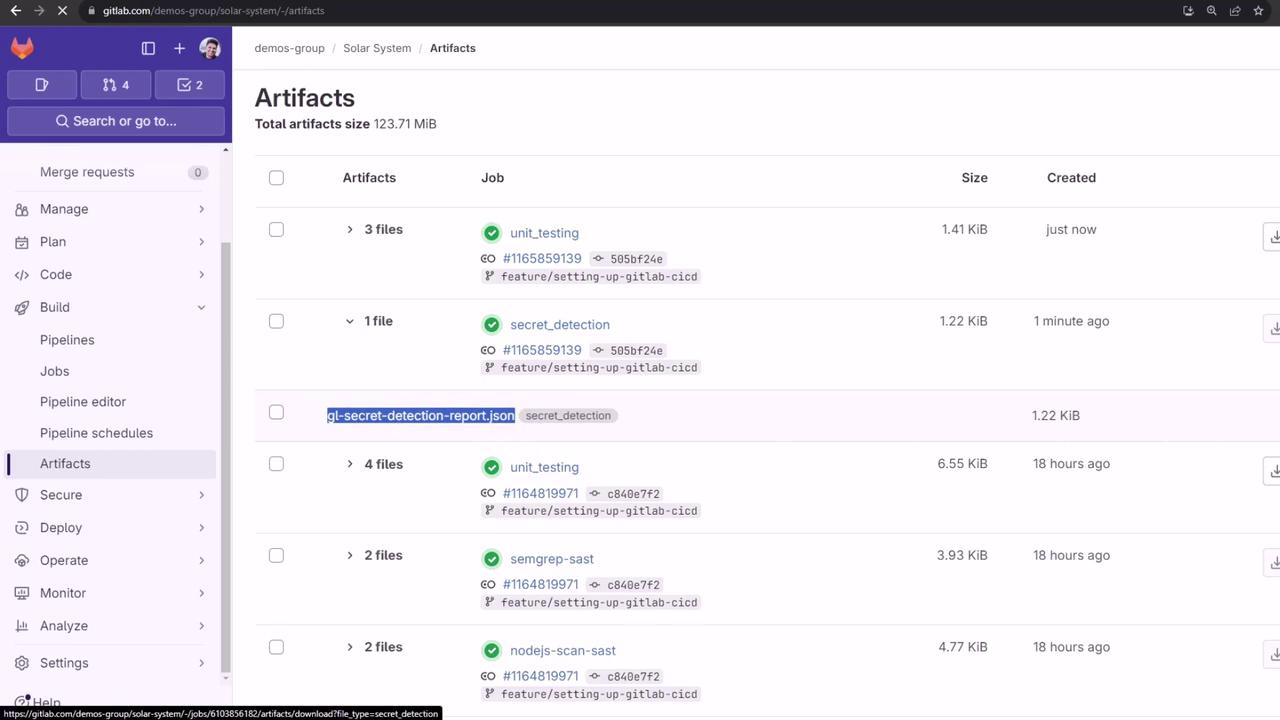GitLab CI/CD: Architecting, Deploying, and Optimizing Pipelines
Optimization Security and Monitoring
Component Secret Detection
Secret Detection is a critical security practice in a GitLab CI/CD pipeline. It scans your repository for sensitive information such as API tokens, SSH keys, and passwords, preventing accidental exposure. In this guide, we’ll walk through configuring Secret Detection using the GitLab Components catalog and Gitleaks under the hood.
Initial Pipeline Setup
Start with a basic pipeline that prepares environments, runs code quality checks, SAST, and unit tests:
variables:
MONGO_URI: 'mongodb+srv://superCluster.d83jj.mongodb.net/superData'
MONGO_USERNAME: superuser
MONGO_PASSWORD: $M_DB_PASSWORD
SCAN_KUBERNETES_MANIFESTS: "true"
.prepare_nodejs_environment: ~
.prepare_deployment_environment: &kubernetes_deploy_job ~
code_quality:
stage: .pre
variables:
REPORT_FORMAT: html
artifacts:
paths:
- gl-code-quality-report.html
reports:
codequality: []
sast:
stage: .pre
unit_testing:
stage: test
extends: .prepare_nodejs_environment
script:
- npm test
Add the Secret Detection Component
Pull in the official component from the GitLab Components catalog and conditionally disable it via a variable:
include:
- component: gitlab.com/gitlab-components/secret-detection/[email protected]
rules:
- if: $SECRET_DETECTION_DISABLED == "true" || $SECRET_DETECTION_DISABLED == "1"
when: never
Note
This component leverages Gitleaks to scan commits and code for secrets.
For full details, visit the Secret Detection documentation.
Ignoring Specific Lines
If you need to keep placeholder secrets or test tokens in your code, annotate those lines so Gitleaks will skip them:
"A personal token for GitLab will look like glpat-JUST20LETTERSANDNUMB" # gitleaks:allow
Warning
Use # gitleaks:allow sparingly—never suppress detection of real or production secrets.
Enabling Full-History Scans
By default, Secret Detection inspects only the diff of each commit. To scan the entire repository history, set:
variables:
SECRET_DETECTION_HISTORIC_SCAN: "true"

Customizing Detection Rules
Gitleaks ships with over 100 built-in rules. You can override or extend these by providing a custom TOML file:
title = "Custom Gitleaks Configuration"
[[rules]]
id = "gitlab_personal_access_token"
description = "GitLab Personal Access Token"
regex = '''\bgitlab-[0-9a-zA-Z\-_]{20}\b'''
tags = ["gitlab", "token"]
keywords = ["glpat"]
[[rules]]
id = "Twilio API Key"
description = "Twilio API Key"
regex = '''5[0-9A-F]{32}'''
keywords = ["twilio", "SK"]
[[rules]]
id = "Facebook token"
description = "Facebook token"
regex = '''(?![0-9]{0,25})(Facebook[a-z0-9-_]{0,5}):([a-z0-9]{32})'''
secretGroup = 2
keywords = ["facebook"]
| Secret Type | Pattern | Example Prefix |
|---|---|---|
| GitLab Personal Access Token | \bgitlab-[0-9a-zA-Z\-_]{20}\b | glpat- |
| Twilio API Key | 5[0-9A-F]{32} | SK |
| Facebook Token | (Facebook…):([a-z0-9]{32}) |

Configuring the Secret Detection Job
Integrate the secret_detection job into your .gitlab-ci.yml:
stages:
- .pre
- test
secret_detection:
stage: .pre
image: "$CI_TEMPLATE_REGISTRY_HOST/security-products/secrets:5"
services: []
allow_failure: true
variables:
GIT_DEPTH: '50'
SECRET_DETECTION_EXCLUDED_PATHS: ''
SECRET_DETECTION_HISTORIC_SCAN: 'true'
artifacts:
reports:
secret_detection: gl-secret-detection-report.json
rules:
- if: '$CI_COMMIT_BRANCH'
when: always
script:
- /analyzer run
unit_testing:
stage: test
extends: .prepare_nodejs_environment
script:
- npm test
You can also edit this in the GitLab Pipeline Editor:

Running a Test Secret Scan
Commit a dummy secret (e.g., an id_rsa SSH private key) to a feature branch and watch the Secret Detection job:
$ /analyzer run
[INFO] [secrets] GitLab secrets analyzer v5.1.19
[INFO] [secrets] Detecting project
[INFO] [secrets] Running analyzer
[INFO] [secrets] gitleaks
[08:05AM] 53 commits scanned.
[08:05AM] INF scan completed in 115ms
[08:05AM] WARN leaks found: 1
Viewing Artifacts
After the job finishes, download the JSON report from the artifacts list:

Interpreting the JSON Report
The gl-secret-detection-report.json includes each finding’s details:
{
"version": "15.0.7",
"vulnerabilities": [
{
"id": "44227fc2996...",
"category": "secret_detection",
"name": "SSH private key",
"description": "SSH private key secret has been found in commit 50bf24e.",
"severity": "Critical",
"raw_source_code_extract": "-----BEGIN OPENSSH PRIVATE KEY-----",
"scanner": {
"id": "gitleaks",
"name": "Gitleaks"
}
}
],
"location": {
"file": "id_rsa",
"commit": {
"author": "Barahalikar Siddharth",
"date": "2024-02-06T08:05:16Z",
"message": "Upload New File",
"sha": "50bf24e579301b8c349a428f89c9edddd6df8"
}
},
"start_line": 1,
"identifiers": ["gitleaks"]
}
Additional scan metadata:
{
"scan": {
"analyzer": {
"id": "secrets",
"name": "secrets",
"version": "5.1.19"
},
"scanner": {
"id": "gitleaks",
"name": "Gitleaks",
"version": "8.18.1"
}
},
"type": "secret_detection",
"status": "success",
"start_time": "2024-02-06T08:05:27",
"end_time": "2024-02-06-08:05:28"
}
Next Steps
- Remove exposed secrets from the current commit.
- Rewrite history to purge sensitive data.
- Rotate any compromised keys or tokens.
References
Watch Video
Watch video content